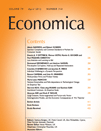
ECONOMICA
Scope & Guideline
Fostering Knowledge in the World of Econometrics
Introduction
Aims and Scopes
- Labor Economics and Employment Dynamics:
Research on labor markets, wage dynamics, employment policies, and the socio-economic factors influencing workforce participation and job quality. - Macroeconomic Policy Analysis:
Exploration of monetary and fiscal policies, their implications on the macroeconomy, and the analysis of economic shocks and their effects. - Gender and Economic Inequality:
Studies examining gender disparities in labor markets, wage gaps, and the socio-economic determinants of inequality. - Trade and Globalization:
Investigations into the impacts of trade policies, globalization, and international competition on domestic economies and labor markets. - Social and Behavioral Economics:
Research focusing on the intersection of economics with social norms, behaviors, and cultural factors influencing economic outcomes. - Public Economics and Policy Evaluation:
Analysis of government policies, taxation, welfare programs, and their effectiveness in addressing economic issues and promoting social welfare.
Trending and Emerging
- Impact of COVID-19 on Economic Structures:
Recent publications have increasingly focused on the economic ramifications of the COVID-19 pandemic, including labor market disruptions, shifts in consumer behavior, and public health policies. - Behavioral Insights in Economic Decision-Making:
There is a growing interest in incorporating behavioral economics into traditional economic analyses, exploring how psychological factors influence economic choices and market outcomes. - Sustainability and Environmental Economics:
Research addressing the economic implications of environmental policies, climate change, and sustainability practices has gained momentum, reflecting a broader concern for ecological impacts. - Digital Economy and Technological Change:
Emerging themes include the effects of digital transformation on labor markets, productivity, and economic structures, highlighting the role of technology in shaping future economic landscapes. - Migration and Its Economic Effects:
Studies on migration patterns, their economic impacts, and associated policy implications have become increasingly relevant in light of global mobility trends and demographic changes.
Declining or Waning
- Traditional Theories of Economic Growth:
There has been a noticeable reduction in papers focusing on classical growth theories, with more emphasis shifting towards contemporary issues such as inequality and behavioral economics. - Static Economic Models:
Research employing static or overly simplistic economic models has diminished, as there is a growing preference for dynamic models that capture complex interactions in economic systems. - Narrowly Defined Sectoral Analyses:
Studies concentrating solely on specific sectors without considering broader economic implications have become less frequent, as there is a trend toward interdisciplinary and holistic approaches.
Similar Journals

Economies
Exploring innovative solutions to global economic challenges.Economies is a premier open-access journal published by MDPI, dedicated to advancing the fields of economics, econometrics, and finance since its inception in 2013. With an E-ISSN of 2227-7099, the journal plays a vital role in disseminating high-quality research that addresses contemporary global economic challenges, fostering a collaborative platform for scholars, industry professionals, and policymakers alike. The journal is based in Switzerland and has gained significant recognition in the academic community, evidenced by its Q2 ranking in both Development and Economics, Econometrics and Finance categories, along with impressive Scopus rankings—55th out of 242 in Economics and 79th out of 306 in Social Sciences Development. This positions Economies as a key resource for those seeking to stay at the forefront of economic research and thought leadership. The journal’s commitment to open access ensures that valuable insights and findings are readily available to the global research community, enhancing knowledge sharing and innovation in the field.

Applied Economic Analysis
Transforming complex economic phenomena into accessible knowledge.Applied Economic Analysis is a distinguished journal published by EMERALD GROUP PUBLISHING LTD, dedicated to advancing the field of economics, econometrics, and finance. Since its transition to Open Access in 2019, the journal has made a significant impact, evidenced by its commendable Q2 ranking in the 2023 category of Economics, Econometrics and Finance (miscellaneous) and an impressive rank of #66 out of 288 in Scopus, placing it in the 77th percentile of its field. With a publication scope extending from 2019 to 2024, the journal serves as a vital platform for researchers, professionals, and students, fostering innovative discussions and insights into applied economic theories and practices. Its output is accessible to a broad audience keen on exploring quantitative and qualitative analyses, thereby enhancing the understanding of complex economic phenomena. As a respected publication emerging from the UK, Applied Economic Analysis plays a pivotal role in shaping contemporary economic discourse and promoting research that bridges theoretical frameworks with real-world application.

American Economic Journal-Macroeconomics
Unraveling Complexities of Economic DynamicsAmerican Economic Journal-Macroeconomics, published by the American Economic Association, stands at the forefront of economic research, addressing pivotal macroeconomic issues that shape global economies. With an impressive Scopus rank of #8 out of 288 in its field and a notable 97th percentile ranking, this journal is widely regarded as a top-tier publication, specifically categorized in the Q1 category for Economics, Econometrics, and Finance as of 2023. Operating under ISSN 1945-7707 and E-ISSN 1945-7715, it aims to disseminate high-quality research from 2009 through 2024 and beyond, providing crucial insights into macroeconomic theory and policy. Although the journal currently does not operate under an open access model, it remains a vital resource for researchers, economists, and students seeking to deepen their understanding of macroeconomic dynamics and their implications for economic policy worldwide. The journal's impactful contributions make it an essential read for those striving to influence economic thought and practice.
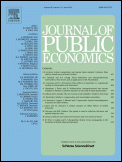
JOURNAL OF PUBLIC ECONOMICS
Transforming public economics with influential research.JOURNAL OF PUBLIC ECONOMICS is a leading academic journal published by ELSEVIER SCIENCE SA, dedicated to the field of public economics, which encompasses a broad range of topics including taxation, government expenditure, and the effects of public policies on the economy. With an impressive impact factor reflected by its prestigious Q1 category rankings in both Economics and Finance, this journal is recognized as a vital resource for researchers and practitioners alike. Its robust Scopus rankings place it in the top percentile, with Finance ranked #8 out of 317 and Economics ranked #19 out of 716, demonstrating its influential role in advancing knowledge and fostering discourse within its discipline. Covering the period from 1972 through 2024, the journal publishes original research and insightful reviews that encourage evidence-based policy-making, making it an essential read for those seeking to deepen their understanding of the intersections between economics and public policy. Please note that the journal operates under a subscription model of access, ensuring high-quality content is readily available to its readership.

EKONOMICKY CASOPIS
Fostering Innovative Discourse in Economics and EconometricsEKONOMICKY CASOPIS is a distinguished journal published by the Institute of Economics Research SAS and the Institute of Forecasting CSPS SAS, offering a comprehensive platform for the dissemination of innovative research in the field of economics and econometrics. Since its inception in 1978, the journal has been committed to fostering scholarly discourse, showcasing empirical studies, theoretical advancements, and policy analyses that contribute to the understanding of economic phenomena. Although categorized in the Q4 quartile in 2023 and ranking in the lower percentiles within Scopus, EKONOMICKY CASOPIS remains a critical resource for researchers and practitioners seeking to engage with the economic challenges of our time. As the journal continues to evolve through 2024, it invites contributions that align with its objectives of enhancing economic insights and promoting academic discussion in Slovakia and beyond. For researchers looking to publish their work or expand their knowledge, EKONOMICKY CASOPIS serves as a vital resource in the expanding landscape of economic research.
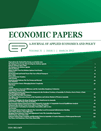
Economic Papers
Advancing Economic Insight, One Paper at a Time.Economic Papers is a prestigious journal published by WILEY, recognized for its contributions to the fields of economics, econometrics, and finance since its inception in 1982. With an impressive impact factor reflecting its scholarly influence, this journal is ranked in the Q2 category in the Economics, Econometrics, and Finance sector, placing it among the top 30% of journals in the field. The journal aims to disseminate high-quality research that addresses contemporary economic challenges, thereby advancing both theoretical understanding and practical applications. While currently not available as open access, Economic Papers provides vital insights for researchers, professionals, and students striving to deepen their comprehension of economic dynamics and contribute to sound policy-making. Scholars are encouraged to submit their work to engage with a robust academic community and impact the discourse in economic research.
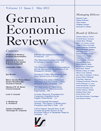
German Economic Review
Illuminating the Landscape of Economics and EconometricsGerman Economic Review is a distinguished academic journal published by WALTER DE GRUYTER GMBH, focusing on diverse aspects of economics and econometrics. With its ISSN 1465-6485 and E-ISSN 1468-0475, the journal serves as a vital platform for disseminating high-quality research from both established scholars and emerging voices in the economic field. Housed in the UK, the journal contributes significantly to the academic community, evidenced by its placement in the Q3 category for Economics and Econometrics in 2023 and its Scopus ranking of #381 out of 716, reflecting its impactful presence in the discipline. German Economic Review does not offer open access options; however, its convergence from 2001 to 2024 indicates a long-standing commitment to advancing economic discourse. This journal is ideal for researchers, professionals, and students eager to engage with contemporary economic theories and applications.
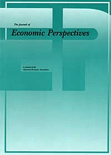
JOURNAL OF ECONOMIC PERSPECTIVES
Empowering Economists with Essential Knowledge and PerspectivesJOURNAL OF ECONOMIC PERSPECTIVES, published by the American Economic Association, is a leading academic journal that serves as a vital resource for researchers, professionals, and students in the fields of economics and econometrics. With an impressive impact factor, it ranks in the top Q1 quartile according to the 2023 statistics, demonstrating its significant influence and contribution to the discipline, particularly with a notable Scopus Rank of #21 out of 716 in the category of Economics and Econometrics. Spanning from 1992 to 2024, the journal provides a platform for rigorous and comprehensive analyses that illuminate contemporary economic issues and perspectives. While it does not currently offer open access options, its thorough and insightful content ensures it remains a respected and essential part of economic literature, addressing a diverse array of topics that resonate with the academic community.
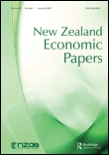
New Zealand Economic Papers
Fostering critical dialogue on New Zealand's economic landscape.New Zealand Economic Papers is a prominent academic journal dedicated to the field of economics, published by Taylor & Francis Ltd. With its ISSN 0077-9954 and E-ISSN 1943-4863, this journal has been a significant contributor to economic discourse since its inception in 1966, continuing to provide valuable insights through to 2024. As part of the third quartile (Q3) in the Economics, Econometrics and Finance category, it ranks at #165 out of 288 in Scopus, placing it within the 42nd percentile, demonstrating its respectable impact in the academic community. Although the journal does not offer open access, it remains a vital resource for researchers, professionals, and students interested in understanding economic dynamics, policy analysis, and applied econometrics, particularly in the context of New Zealand. The journal's commitment to rigorous research ensures that it continues to play a crucial role in shaping economic policy and academic thought across the globe.
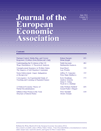
Journal of the European Economic Association
Advancing Economic Insights Across BordersThe Journal of the European Economic Association, published by Oxford University Press, stands as a cornerstone in the field of economics, boasting a strong impact factor that reflects its high citation rates and significance among peers. With an impressive Scopus ranking of 12 out of 288 in general economics, encompassing a remarkable 96th percentile, this journal is recognized for its rigorous peer-reviewed research contributions that advance the understanding of economic theory and policy. Dedicated to publishing innovative studies and theoretical advancements since its inception in 2003, it continues to engage scholars worldwide, providing vital insights applicable to both academia and industry. Although it does not follow an open-access model, the journal's extensive reach and commitment to excellence make it an essential resource for researchers, professionals, and students seeking to deepen their understanding of contemporary economic issues. Based in the United States, the journal reflects a European perspective on global economic challenges, making it indispensable for those at the forefront of economic research.